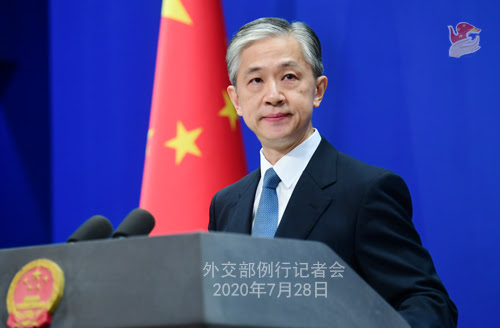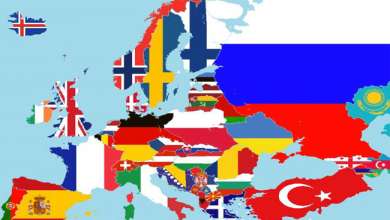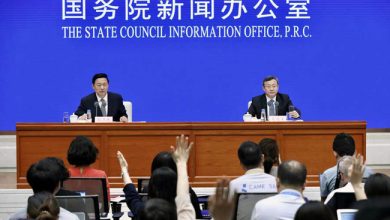China’s policy on the South China Sea remains consistent, stable and unchanged

Lately, Canada, Australia and the UK, citing the Law on Safeguarding National Security in the Hong Kong SAR as an excuse, unilaterally suspended extradition agreements with the HKSAR. Such actions constitute gross interference in China’s internal affairs and grave violation of international law and basic norms governing international relations. China firmly opposes that.
Under the framework of these agreements, the Hong Kong SAR, with the Central Government’s assistance and mandate and in accordance with the Basic Law, has offered assistance to the Canadian, Australian and British sides. By wrongfully politicizing judicial cooperation with Hong Kong, the three countries have seriously damaged the foundation for such cooperation and deviated from its purpose of upholding justice and rule of law. Therefore, China has decided that the Hong Kong SAR will suspend its agreements on surrendering fugitive offenders with Canada, Australia and the UK. At the same time, China has decided that the Hong Kong SAR will suspend its agreements on mutual legal assistance in criminal matters with Canada, Australia and the UK.
CCTV: The US National Institutes of Health released initial results of an investigation into foreign influence in US research. According to the report, of the 189 scientists probed, only 4%, or seven scientists are found to be involved in potential intellectual property right issues, which have not yet been tested by court to meet the criteria for conviction. Head of the NIH called for more dialogue and cooperation with China, instead of creating a poisonous environment for researchers. I wonder if you have any comment?
Wang Wenbin: For some time, certain people in the US have been stretching the national security concept and weaving charges like intellectual property theft to vilify and smear Chinese scientific personnel and students in the US. China has stated its solemn position on this multiple times. Now that the investigation results are out, perhaps you can ask the US side for a comment.
In our globalized era, the cross-border flow of talent has driven technological and economic progress all across the world. We hope the US side will heed the rational and objective voice from its scientific community, respect facts, follow universal rules and trend of the times in international scientific cooperation, and work to promote instead of disrupting China-US scientific exchange and cooperation.
Beijing Daily: On July 27, the World Bank issued a report titled “China’s Doing Business Success: Drivers of Reforms and Opportunities for the Future“. It says that China’s reform measures in the past years can serve as experience for other economies to learn from, which will improve the global business environment. As the world economy is taking difficult steps toward recovery, how will China share its experience with the world to help the global economic recovery?
Wang Wenbin: The World Bank’s report of “China’s Doing Business Success” provides an accurate account of the outcomes China has achieved in advancing reform and opening up following the new development concept.
In recent years China has been fostering a stable, fair, transparent and predictable business environment ranking higher globally each year. The World Bank’s Doing Business Report 2020 ranks China 31st, up from the 78th place two years ago. For two consecutive years China has been on the list of ten economies where business climates improved the most.
Despite the severe challenges brought by COVID-19, China is orderly resuming work, production, business and markets, helping our economy and society gradually come back to normal. In the second quarter, the Chinese economy achieved a growth rate of 3.2 percent, laying a solid foundation for sustained recovery in the second half of the year. We are the first major economy to achieve positive growth after having a negative growth rate earlier this year. Those working in the international economic and financial sectors are optimistic about the prospects of China’s economy and its long-term growth. The US business community also see promising prospects for China’s economy. They welcome more reform and opening-up measures rolled out by the Chinese government, and they would like to continue establishing and expanding business in China.
China will continue fostering a market-oriented and world-class business environment governed by a sound legal framework and implementing the Foreign Investment Law and the regulation on optimizing business environment. We welcome more foreign businesses to invest and operate in China. By contributing to a vibrant Chinese economy through facilitating unfettered flow of all elements, they will also inject new impetus into world economic recovery.
Bloomberg: This is in relation to an NHK report from Japan whereby a group on the Liberal Democratic Party has said that it wants to examine the risks associated with Chinese apps. This is coming amid concerns over data security and national security. What is your comment on this?
Wang Wenbin: I want to reiterate that the Chinese government consistently requires Chinese enterprises to observe international rules and local laws and regulations when conducting cooperation overseas. Foreign governments are also duty-bound to ensure the legitimate rights and interests of international investors, including Chinese enterprises, in accordance with market principles.
Meanwhile, I want to highlight that China’s practical cooperation with other countries is for mutual benefit and win-win results. We hope such cooperation will not be hindered by non-market factors.
China Review News: Philippine President Rodrigo Duterte said in his annual State of the Nation Address on July 27 that the Philippines will continue upholding an independent foreign policy, will not pick sides between China and the US, will not agree to allow US troops back to military bases in the country, and will not confront China over the South China Sea. He also expressed hope for priority access once China successfully develops a COVID-19 vaccine. Do you have a comment?
Wang Wenbin: All countries are endowed with the right to uphold an independent foreign policy and to develop foreign relations based on its national interests. President Duterte’s policy propositions are in keeping with the fundamental interests of the Philippines, the shared aspiration of regional countries, and the trend of the times for peace and development.
China’s position on the South China Sea is consistent and clear. As has been proven, properly handling this issue is in the interest of both China and the Philippines and regional peace and stability. We appreciate President Duterte’s remarks and stand ready to properly resolve maritime disputes with the Philippines through friendly consultations to jointly safeguard peace and stability in the South China Sea and the entire region.
Since the outbreak of COVID-19, China and the Philippines have been standing together with mutual assistance, turning anti-epidemic cooperation a new highlight in bilateral relations. The Philippines is a friendly close neighbor and we will give priority to its needs once we succeed in developing a vaccine.
Bloomberg: I’d like to ask about New Zealand’s suspension of its extradition treaty with Hong Kong. As you know, New Zealand has suspended its agreement, and the foreign affairs minister Winston Peters said that the national security law for Hong Kong undermines the “one country, two systems” framework. Peters added that New Zealand can no longer trust that Hong Kong’s criminal justice system is sufficiently independent from China. So I note the statement on the Chinese embassy in Wellington website. My question is what’s the Foreign Ministry’s response and do you have anything to add to the embassy’s statement?
Wang Wenbin: New Zealand’s comments and measures announced are based entirely on its wrong interpretation of China’s Law on Safeguarding National Security in the Hong Kong SAR. They are in serious violation of international law and basic norms governing international relations, and constitute gross interference in China’s internal affairs. China strongly objects that and reserves the right to make further responses.
I’d like to reiterate that the Chinese government is determined in safeguarding national sovereignty, security and development interests, as well as opposing foreign interference in Hong Kong affairs. Attempts to pressure China will never succeed. China urges New Zealand to immediately correct its mistake and stop interfering in China’s Hong Kong affairs to avoid damage to bilateral relations.
Macau Monthly: According to reports, Meng Wanzhou’s lawyers demanded at a court hearing on July 27 the release of unredacted Canadian intelligence service documents they say would provide proof of a plot between the US and Canadian authorities. Meng had been questioned for three hours by Canadian customs agents at Vancouver airport without knowing what she was accused of, before being formally arrested. She was misled and tricked. But the Canadian Attorney General’s lawyer opposed the unredacted publication of the documents and denied any plot with the FBI. A Canadian foreign ministry official said in a statement to a court in July that the full disclosure of the documents could renew tensions between the two countries and put Canadians in danger. What’s China’s comment?
Wang Wenbin: We note relevant reports and express concern over the fact that the Canadian side refuses to disclose necessary case information to Ms. Meng Wanzhou’s legal team. We have lodged solemn representations with the Canadian side over this. We wonder, does judicial justice in Canada mean interfering in judicial cases by concealing information?
All unbiased people can see clearly that the Meng Wanzhou incident is a serious political incident. Once again we urge the Canadian side to treat China’s solemn position and concerns seriously, proceed from the merits of the incident itself and Canada’s own interests, and properly resolve the matter as soon as possible.
CCTV: According to a July 24 statement from the US White House, the US no longer subjects drones that fly under 800 kilometers per hour to Missile Technology Control Regime (MTCR)’s high export restrictions. It also says that the US looks forward to other nations including China joining it in adopting this new standard. What is your comment?
Wang Wenbin: We have noted relevant information. The US administration, in disregard of the concerns of other MTCR member states, unilaterally loosened its standards on Unmanned Aerial Systems (UAS) export control, which is a new example of its unilateral approach and lack of trustworthiness.
The US, as the world’s top arms dealer, has been severely damaging global and regional peace and stability through dumping arms all over the world for many years. It even resorted to using arms deals to flagrantly interfere in other countries’ internal affairs for its own gains. It went so far as to promote its domestic standards as international ones and judge and meddle in others’ legit arms trade by them. I fail to see why anyone should join it in adopting this kind of behavior.
Shenzhen TV: US Secretary of State Pompeo tweeted that the South China Sea is not China’s maritime empire, and that Beijing violates international law. Do you have any comment?
Wang Wenbin: Recently Pompeo has talked a lot about the South China Sea to smear and attack China. One cannot help but wonder: are some US politicians trying to stir up troubles in the South China Sea?
China’s policy on the South China Sea remains consistent, stable and unchanged. China earnestly upholds international law including the UNCLOS. We never expanded our sovereign claims, and we are committed to negotiation and consultation to settle the territorial and maritime disputes with neighboring countries based on international law and the respect for historical facts. We have been honoring the Declaration on the Conduct of Parties in the South China Sea (DOC), and we are working with ASEAN countries to advance consultations on a Code of Conduct (COC) in the South China Sea in the hope of an early conclusion.
Pompeo surely talked a lot about international law, but as is known to all, the US always seeks selfish gains under the pretext of upholding international law. Its all-time principle is to apply international law in a selective and utilitarian way. The US, having withdrawn from over 10 international treaties and organizations, is indeed the world’s number one quitter. The wars and military operations it launched in countries including Iraq, Libya and Syria caused more than 800,000 deaths and left tens of millions displaced.
The fact is, the country that is militarizing and stoking tensions in the South China Sea is the US, not China. According to media reports, in the first half of this year, US military aircraft carried out over 2,000 missions in the South China Sea. Since July 15, US military aircraft have conducted close range reconnaissance in the South China Sea for 12 consecutive days. Recently the US also sent two aircraft carriers to these waters while calling on its allies and partners to send warships and join it in making waves in the South China Sea. This is bad news for regional peace and stability and doesn’t serve the interests of littoral countries in the region. The US must unmask its hidden agenda.
The US is neither a party to the South China Sea issue nor a signatory to the UNCLOS. However, it insists on hyping up this issue in blatant breach of its commitment of not taking a position on the South China Sea. It aims to drive a wedge between China and ASEAN countries and stir up trouble so it has one more card to play to contain China.
We must tell Pompeo that the South China Sea is not Hawaii; the regional countries and all peace-loving people won’t stand by if several US politicians attempt to muddy the waters.
Reuters: So may I ask you to reconfirm which countries Hong Kong has now suspended cooperation on criminal matters with?
Wang Wenbin: China has decided that the Hong Kong SAR will suspend its agreements on surrendering fugitive offenders with Canada, Australia and the UK and at the same time, suspend its agreements on mutual legal assistance in criminal matters with Canada, Australia and the UK.
Global Times: According to media reports, sources say amid ongoing diplomatic and military talks, Chinese and Indian troops have completed disengagement at three localities, namely, Galwan Valley, Hot Springs and Kongka Pass. The only area where disengagement is left to be implemented is along the Pangong Lake. Can you confirm this and share more information?
Wang Wenbin: Recently China and India have held frequent communication via diplomatic and military channels, with four rounds of commander-level talks and three meetings under the Working Mechanism for Consultation and Coordination on China-India Border Affairs. As border troops have disengaged in most localities, the situation on the ground is deescalating and the temperature is coming down. Currently the two sides are actively preparing for the fifth round of commander-level talks to resolve outstanding issues on the ground. We hope the Indian side will work towards the same goal with China, implement the two sides’ consensus and jointly uphold peace and tranquility along the border.
Xinhua News Agency: On July 27, State Councilor and Foreign Minister Wang Yi hosted a video conference of foreign ministers of China, Afghanistan, Pakistan and Nepal on COVID-19. Could you talk about the consensus reached?
Wang Wenbin: On July 27, State Councilor and Foreign Minister Wang Yi chaired the video conference of foreign ministers of China, Afghanistan, Pakistan and Nepal on COVID-19. It was the result of a Chinese proposal that has won strong support from the other three countries. The ministers held an in-depth exchange of views on strengthening anti-epidemic cooperation and boosting socioeconomic recovery and reached broad consensus.
They agree that as neighbors and partners, the four countries have shared information in a timely manner and achieved fruitful results in jointly fighting the virus. As we continue the fight on an ongoing basis, efforts should be made to enhance international cooperation in prevention and control, safeguard public health, boost resumption of work and production, facilitate the unfettered flow of cross-border trade and ensure livelihoods until a final victory is declared.
The ministers all agree that solidarity and cooperation is the most powerful weapon to defeat the virus. We should adhere to multilateralism, support WHO’s leading role, uphold regional and global public health security, and strive to build a community with a shared future for mankind.
The four sides will enhance information-sharing and policy and action coordination, and step up exchange and cooperation in epidemic prevention and control. China is ready to strengthen cooperation with the other parties on testing, treatment, drugs and vaccines and help them with public health capacity building. China reiterated that once it develops a vaccine, it will be made a global public health product. China will also help increase vaccine accessibility in the three countries. Foreign ministers of Afghanistan, Pakistan and Nepal all appreciated this and expressed readiness to enhance anti-epidemic cooperation with China.
The four sides agree to work together to gradually resume cross-border flow where the conditions are ripe. A standard operating procedure will be formulated to cover notification, border management and control, quarantine and emergency response to block cross-border transmission of the virus. Discussion will also be held on establishing a fast lane for personnel and a logistics green lane.
It was also agreed that the four countries will continue BRI cooperation. The ministers stressed that responsible public information dissemination is vital. Science-based professional exchange on prevention and control should be held. In the process of fighting the pandemic, there must be no discrimination, stigmatization, racism or xenophobia of any form.
Reuters: The US Department of Agriculture warned US residents not to plant unsolicited packages of seeds that arrived from China because they could be invasive species that could threaten crops or livestock. Do you have any comment on this?
Wang Wenbin: I’ve noticed that the news has received some attention in the US and beyond.
I want to point out that plant seeds are articles prohibited as imports (or in transit) or admitted conditionally for UPU member countries. China Post strictly follows the UPU provisions and prohibits seeds from conveyance by post. USPS recently found some packages of seeds with address labels suggesting they were sent from China. After verification with China Post, those address labels turned out to be fake ones with erroneous layouts and entries. China Post has contacted USPS, asking it to send those fake packages to China for investigation.
Chosun Ilbo: Chairman of the Workers’ Party of Korea Kim Jong Un said in an article on July 27 that the DPRK has reliable nuclear deterrence to guarantee the country’s permanent security and bright prospects. I wonder if you have any comment?
Wang Wenbin: The main reason for the current stalemate in the process of Korean Peninsula peace talks is that the DPRK’s legitimate concerns are not paid enough attention to or addressed. China calls on all sides to stick to dialogue and consultation, demonstrate flexibility on issues of mutual concern, and make concrete efforts toward denuclearization of the Peninsula and lasting peace of the Peninsula and the region.
AFP: The United States and Australia are currently holding high-level talks where they are expected to discuss China. How does China view these talks and do you have any expectations for how they will turn out?
Wang Wenbin: China holds a consistent position on the US-Australia consultations you mentioned. We take no position on the normal exchange and cooperation between regional countries. However, such cooperation should be conducive to regional peace, stability and mutual trust between regional countries. It should not target a third party or undermine its
PTI: You’ve said about the next commander-level talks. Do you have any date for these talks? When are they going to be held?
Wang Wenbin: Please stay tuned. If there’s new information, we will release it in a timely manner.





